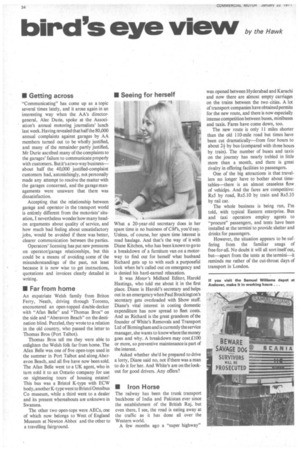bird's eye view by the Hawk
Page 36

If you've noticed an error in this article please click here to report it so we can fix it.
• Getting across
"Communicating" has cane up as a topic several times lately, and it arose again in an interesting way when the AA's directorgeneral, Alec Dune, spoke at the Association's annual motoring journalists' lunch last week. Having revealed that half the 80,000 annual complaints against garages by AA members turned out to be wholly justified, and many of the remainder partly justified, Mr Dune ascribed many of the complaints to the garages' failure to communicate properly with customers. But it's a two-way business— about half the 40,000 justified-complaint customers had, astonishingly, not personally made any attempt to resolve the matter with the garages concerned, and the garage managements were unaware that there was dissatisfaction.
Accepting that the relationship between garage and operator in the transport world is entirely different from the motorists' situation, I nevertheless wonder how many headon arguments about quality of service, and how much bad feeling about unsatisfactory jobs, would be avoided if there was better, clearer communication between the parties.
Operators' licensing has put new pressures on operator/garage relationships, but this could be a means of avoiding some of the misunderstandings of the past, not least because it is now wise to get instructions, quotations and invoices clearly detailed in writing.
• Far from home
An expatriate Welsh family from Briton Ferry, Neath, driving through Toronto, encountered an open-topped double-decker with "Man Belle" and "Thomas Bros" on the side and "Aberavon Beach" on the destination blind. Puzzled, they wrote to a relation in the old country, who passed the letter to Thomas Bros (Port Talbot).
Thomas Bros tell me they were able to enlighten the Welsh folk far from home. The Man Belle was one of five open-tops used in the summer in Port Talbot and along Abe ravon Beach, and all five have now been sold. The Afan Belle went to a UK agent, who in turn sold it to an Ontario company for use on sightseeing tours of housing estates! This bus was a Bristol K-type with ECW body, another K-type went to Bristol Omnibus Co museum, while a third went to a dealer and its present whereabouts are unknown in Swansea.
The other two open-tops were AECs, one of which now belongs to West of England Museum at Newton Abbot and the other to a travelling fairground. What a 20-year-old secretary does in her spare time is no business of CM's, you'd say. Unless, of course, her spare time interest is road haulage. And that's the way of it with Diane Kitchen, who has been known to go to a breakdown of a furniture van on a motorway to find out for herself what husband Richard gets up to with such a purposeful look when he's called out on emergency and is denied his hard-earned relaxation.
It was Motor's Midland Editor, Harold Hastings, who told me about it in the first place. Diane is Harold's secretary and helps out in an emergency when Paul Brockington's secretary gets overloaded with Show stuff. Diane's vital interest in costing domestic expenditure has now spread to fleet costs. And as Richard is the great grandson of the founder of White's Removals and Transport Ltd of Birmingham and is currently the service manager, she wants to know where the money goes and why. A breakdown may cost £100 or more, so preventive maintenance is part of the interest.
Asked whether she'd be prepared to drive a lorry, Diane said no, not if there was a man to do it for her. And White's are on the lookout for good drivers. Any offers?
• Iron Horse
The railway has been the trunk transport backbone of India and Pakistan ever since the establishment of the British Raj, but even there, I see, the road is eating away at the traffic as it has done all over the Western world.
A few months ago a "super highway" was opened between Hyderabad and Karachi and now there are almost empty carriages on the trains between the two cities. A lot of transport companies have obtained permits for the new route, and there is now especially intense competition between buses, minibuses and taxis. Fares have come down, too.
The new route is only 11 miles shorter than the old 110-mile road but times have been cut dramatically—from four hours to about 24 by bus (compared with three hours by train). The number of buses and taxis on the journey has nearly trebled in little more than a month, and there is great rivalry in offering facilities to passengers.
One of the big attractions is that travellers no longer have to bother about timetables—there is an almost ceaseless flow. of vehickes. And the fares are competitive: Rs5 by road, Rs5.10 by train and Rs5.35 by rail car.
The whole business is being run, I'm told, with typical Eastern enterprise. Bus and taxi operators employ agents to "procure" passengers, and tents have been installed at the termini to provide shelter and drinks for passengers.
However, the situation appears to be suffering from the familiar snags of free-for-all. No doubt it will all sort itself out, but—apart from the tents at the termini—it reminds me rather of the cut-throat days of transport in London.




































































































